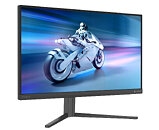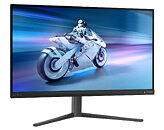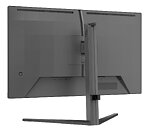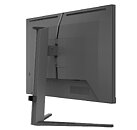- Joined
- Oct 9, 2007
- Messages
- 47,314 (7.52/day)
- Location
- Hyderabad, India
| System Name | RBMK-1000 |
|---|---|
| Processor | AMD Ryzen 7 5700G |
| Motherboard | ASUS ROG Strix B450-E Gaming |
| Cooling | DeepCool Gammax L240 V2 |
| Memory | 2x 8GB G.Skill Sniper X |
| Video Card(s) | Palit GeForce RTX 2080 SUPER GameRock |
| Storage | Western Digital Black NVMe 512GB |
| Display(s) | BenQ 1440p 60 Hz 27-inch |
| Case | Corsair Carbide 100R |
| Audio Device(s) | ASUS SupremeFX S1220A |
| Power Supply | Cooler Master MWE Gold 650W |
| Mouse | ASUS ROG Strix Impact |
| Keyboard | Gamdias Hermes E2 |
| Software | Windows 11 Pro |
Evnia introduces a fresh award-winning addition to its 5000 gaming monitor series. The Philips Evnia 27M2N5500 features everything users need to enjoy an electrifying gaming experience and consistently excellent performance, while paying greater attention to sustainability: a 27" (68.5 cm) Fast IPS panel with QHD resolution, 180 Hz refresh rate, up to 0.5 ms MPRT and 1 ms GtG, DisplayHDR 400 and an all-new, environmentally friendly design.
The Philips Evnia 27M2N5500 holds a gaming edge with its Fast IPS panel, which delivers smooth gameplay and captivating visuals by balancing rapid responsiveness and brilliance. Certified with VESA DisplayHDR 400 and supporting 1.07 billion colours on high-performance panels with an impressive density pixel count, this monitor produces astonishing brightness, contrast and colours with deeper, richer blacks and a fuller palette of vibrant hues.




In addition to its punchy colours and visually captivating experience, the Philips Evnia 27M2N5500 also features a refresh rate of 180 Hz and low input lag for lightning-fast gaming with virtually no motion blur or ghosting. For an even better gaming experience, this monitor is equipped with several new features: Smart MBR Sync combines 0.5 ms MPRT and variable refresh rate (Adaptive-Sync) support for sharp as well as speedy gaming visuals free from motion blur. The ShadowBoost feature in the OSD enhances dark scenes to enjoy even more details, without overexposure. And to better hit targets in a variety of scenes, the Philips Evnia 27M2N5500 includes a Smart Crosshair for a more accurate aim.
Award-winning and sustainable design for peak performance
This monitor has a green soul and thus strives for sustainability: for the first time ever in the Philips gaming monitor portfolio, the stand's feet are made with 35% recycled plastic and the monitor's chassis is made of 85% post-consumer recycled plastic.
"With Evnia, we are clearly making an important transition toward greater sustainability," commented Xeni Bairaktari, Head of Global Marketing & Deputy Director Marketing EU at Philips Monitors & IT Accessories. "One of our core values is being a positive and impactful pioneer in the industry, and we cannot refrain from challenging ourselves to be more intentional about caring for the environment. We're proud of this new design and approach, and we hope to inspire a real change in the gaming industry."
Created with immersive gaming and high-quality performance in mind, the Philips Evnia 27M2N5500 is equipped with features specifically adapted for both long gaming sessions and everyday use, all within a monitor whose exceptional design has received a 2023 Red Dot and a 2023 iF Design Award. It thus includes an array of features designed to enhance user well-being and ensure a fuller, more comfortable experience. In addition to its SmartErgoBase, which enables a wide range of ergonomic adjustments (height, pivot, swivel, and tilt), this monitor is equipped with SmartImage game modes optimised for long sessions, new OSD features and an EasySelect menu toggle key for quick OSD access, as well as LowBlue Mode to protect the eyes from long periods of blue light exposure.
Price and availability for the Philips Evnia 27M2N5500
With this much to offer, the Philips Evnia 27M2N5500 gaming monitor is the perfect choice for anyone wishing to best support their performance or upgrade their set-up with a fast and visually immersive monitor that takes every session to the next level.
The Philips Evnia 27M2N5500 monitor will be available for purchase in May 2024 at an MSRP of £239.99. For more information, visit the product page.
View at TechPowerUp Main Site
The Philips Evnia 27M2N5500 holds a gaming edge with its Fast IPS panel, which delivers smooth gameplay and captivating visuals by balancing rapid responsiveness and brilliance. Certified with VESA DisplayHDR 400 and supporting 1.07 billion colours on high-performance panels with an impressive density pixel count, this monitor produces astonishing brightness, contrast and colours with deeper, richer blacks and a fuller palette of vibrant hues.




In addition to its punchy colours and visually captivating experience, the Philips Evnia 27M2N5500 also features a refresh rate of 180 Hz and low input lag for lightning-fast gaming with virtually no motion blur or ghosting. For an even better gaming experience, this monitor is equipped with several new features: Smart MBR Sync combines 0.5 ms MPRT and variable refresh rate (Adaptive-Sync) support for sharp as well as speedy gaming visuals free from motion blur. The ShadowBoost feature in the OSD enhances dark scenes to enjoy even more details, without overexposure. And to better hit targets in a variety of scenes, the Philips Evnia 27M2N5500 includes a Smart Crosshair for a more accurate aim.
Award-winning and sustainable design for peak performance
This monitor has a green soul and thus strives for sustainability: for the first time ever in the Philips gaming monitor portfolio, the stand's feet are made with 35% recycled plastic and the monitor's chassis is made of 85% post-consumer recycled plastic.
"With Evnia, we are clearly making an important transition toward greater sustainability," commented Xeni Bairaktari, Head of Global Marketing & Deputy Director Marketing EU at Philips Monitors & IT Accessories. "One of our core values is being a positive and impactful pioneer in the industry, and we cannot refrain from challenging ourselves to be more intentional about caring for the environment. We're proud of this new design and approach, and we hope to inspire a real change in the gaming industry."
Created with immersive gaming and high-quality performance in mind, the Philips Evnia 27M2N5500 is equipped with features specifically adapted for both long gaming sessions and everyday use, all within a monitor whose exceptional design has received a 2023 Red Dot and a 2023 iF Design Award. It thus includes an array of features designed to enhance user well-being and ensure a fuller, more comfortable experience. In addition to its SmartErgoBase, which enables a wide range of ergonomic adjustments (height, pivot, swivel, and tilt), this monitor is equipped with SmartImage game modes optimised for long sessions, new OSD features and an EasySelect menu toggle key for quick OSD access, as well as LowBlue Mode to protect the eyes from long periods of blue light exposure.
Price and availability for the Philips Evnia 27M2N5500
With this much to offer, the Philips Evnia 27M2N5500 gaming monitor is the perfect choice for anyone wishing to best support their performance or upgrade their set-up with a fast and visually immersive monitor that takes every session to the next level.
The Philips Evnia 27M2N5500 monitor will be available for purchase in May 2024 at an MSRP of £239.99. For more information, visit the product page.
View at TechPowerUp Main Site



